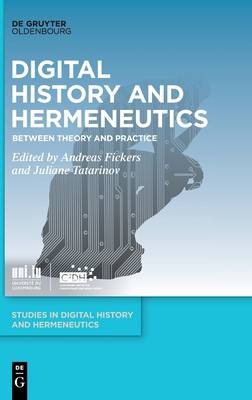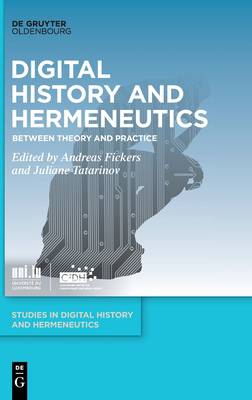
Bedankt voor het vertrouwen het afgelopen jaar! Om jou te bedanken bieden we GRATIS verzending (in België) aan op alles gedurende de hele maand januari.
- Afhalen na 1 uur in een winkel met voorraad
- In januari gratis thuislevering in België
- Ruim aanbod met 7 miljoen producten
Bedankt voor het vertrouwen het afgelopen jaar! Om jou te bedanken bieden we GRATIS verzending (in België) aan op alles gedurende de hele maand januari.
- Afhalen na 1 uur in een winkel met voorraad
- In januari gratis thuislevering in België
- Ruim aanbod met 7 miljoen producten
Zoeken
Digital History and Hermeneutics
Between Theory and Practice
€ 53,45
+ 106 punten
Omschrijving
As a result of rapid advancements in computer science during recent decades, there has been an increased use of digital tools, methodologies and sources in the field of digital humanities. While opening up new opportunities for scholarship, many digital methods and tools now used for humanities research have nevertheless been developed by computer or data sciences and thus require a critical understanding of their mode of operation and functionality.
The novel field of digital hermeneutics is meant to provide such a critical and reflexive frame for digital humanities research by acquiring digital literacy and skills. A new knowledge for the assessment of digital data, research infrastructures, analytical tools, and interpretative methods is needed, providing the humanities scholar with the necessary munition for doing critical research. The Doctoral Training Unit "Digital History and Hermeneutics" at the University of Luxembourg applies this analytical frame to 13 PhD projects. By combining a hermeneutic reflection on the new digital practices of humanities scholarship with hands-on experimentation with digital tools and methods, new approaches and opportunities as well as limitations and flaws can be addressed.
The novel field of digital hermeneutics is meant to provide such a critical and reflexive frame for digital humanities research by acquiring digital literacy and skills. A new knowledge for the assessment of digital data, research infrastructures, analytical tools, and interpretative methods is needed, providing the humanities scholar with the necessary munition for doing critical research. The Doctoral Training Unit "Digital History and Hermeneutics" at the University of Luxembourg applies this analytical frame to 13 PhD projects. By combining a hermeneutic reflection on the new digital practices of humanities scholarship with hands-on experimentation with digital tools and methods, new approaches and opportunities as well as limitations and flaws can be addressed.
Specificaties
Betrokkenen
- Uitgeverij:
Inhoud
- Aantal bladzijden:
- 312
- Taal:
- Engels
- Reeks:
- Reeksnummer:
- nr. 2
Eigenschappen
- Productcode (EAN):
- 9783110723878
- Verschijningsdatum:
- 21/06/2022
- Uitvoering:
- Hardcover
- Formaat:
- Genaaid
- Afmetingen:
- 156 mm x 234 mm
- Gewicht:
- 616 g

Alleen bij Standaard Boekhandel
+ 106 punten op je klantenkaart van Standaard Boekhandel
Beoordelingen
We publiceren alleen reviews die voldoen aan de voorwaarden voor reviews. Bekijk onze voorwaarden voor reviews.








